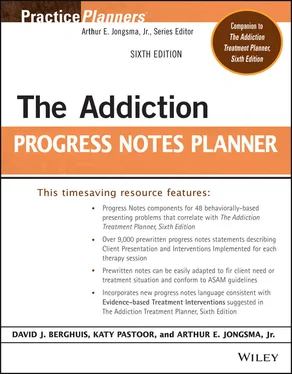The Addiction Progress Notes Planner
Здесь есть возможность читать онлайн «The Addiction Progress Notes Planner» — ознакомительный отрывок электронной книги совершенно бесплатно, а после прочтения отрывка купить полную версию. В некоторых случаях можно слушать аудио, скачать через торрент в формате fb2 и присутствует краткое содержание. Жанр: unrecognised, на английском языке. Описание произведения, (предисловие) а так же отзывы посетителей доступны на портале библиотеки ЛибКат.
- Название:The Addiction Progress Notes Planner
- Автор:
- Жанр:
- Год:неизвестен
- ISBN:нет данных
- Рейтинг книги:5 / 5. Голосов: 1
-
Избранное:Добавить в избранное
- Отзывы:
-
Ваша оценка:
- 100
- 1
- 2
- 3
- 4
- 5
The Addiction Progress Notes Planner: краткое содержание, описание и аннотация
Предлагаем к чтению аннотацию, описание, краткое содержание или предисловие (зависит от того, что написал сам автор книги «The Addiction Progress Notes Planner»). Если вы не нашли необходимую информацию о книге — напишите в комментариях, мы постараемся отыскать её.
The Addiction Progress Notes Planner, Sixth Edition
Addictions Treatment Planner, Sixth Edition
Addiction Treatment Planner, Sixth Edition
The Addiction Progress Notes Planner
The Addiction Progress Notes Planner — читать онлайн ознакомительный отрывок
Ниже представлен текст книги, разбитый по страницам. Система сохранения места последней прочитанной страницы, позволяет с удобством читать онлайн бесплатно книгу «The Addiction Progress Notes Planner», без необходимости каждый раз заново искать на чём Вы остановились. Поставьте закладку, и сможете в любой момент перейти на страницу, на которой закончили чтение.
Интервал:
Закладка:
27 Explore Family Response to Sharing Feelings (27)The client was asked to identify how the family responded to expressions of feelings, wishes, and wants.It was noted that the client identified negative responses from family members during childhood regarding the expression of feelings.It was noted that the client identified a connection between learning in childhood that it was dangerous to share feelings with others and current problems with sharing feelings with peers.The client did not complete the assignment to help understand family history and was redirected to do so.The client denied the family's history of negative responses to sharing feelings; this was accepted.
28 Educate About Healthy Relationships (28)The client was presented with information about building healthy interpersonal relationships through openness, respect, and honesty, including the sharing of feelings to build trust and mutual understanding.The client was assigned the honesty exercise in The Alcoholism and Drug Abuse Client Workbook (Perkinson).The client has completed the honesty exercise and the responses were processed.The client has not completed the honesty exercise from The Alcoholism and Drug Abuse Client Workbook (Perkinson) and was redirected to do so.The client acknowledged situations in which they could increase sharing of feelings in order to build trust and mutual understanding; the client was directed to do so.The client was supported while recounting situations in which they used openness and honesty in order to increase trust and mutual understanding.
29 Explore the Client's Focus on Others (29)The client was assisted in comparing reluctance to share personal problems with their pattern of focusing on helping others with their problems.Active listening skills were used as the client expressed an understanding of how childhood experiences have prompted the client to focus on helping others as a way to resist sharing personal problems.The client struggled to identify a pattern of resistance to sharing personal problems and was provided with examples of this pattern.
30 Connect Overhelping Others With Low Self-Esteem (30)The client was presented with the concept that overemphasis on helping others is based on low self-esteem and a need for acceptance, which was learned in the alcoholic family of origin.The client was presented with the concept that caretaking behavior often results from choosing friends and partners who are chemically dependent or psychologically disturbed.The client rejected the concept that helping others is based on low self-esteem and relates to choosing friends who are chemically dependent or psychologically disturbed; the client was urged to review this pattern.The client was reinforced in accepting the concept that they have a strong need to help others because of low self-esteem.The client was able to connect caretaking behavior to the choice of friends who are chemically dependent or psychologically disturbed; this insight was reinforced.
31 Teach Recovery Group Involvement (31)The client was taught about how active involvement in a 12-step recovery group is a way to build trust in others and self-confidence.The client was referred to an appropriate 12-step recovery group.Active listening was provided as the client described involvement in an active 12-step recovery group.The client reported that they had not followed through with involvement in a 12-step recovery group and was redirected to do so.The client reported that they had not followed through with involvement in a 12-step recovery group and was instead assigned the Step 12 exercise in The Alcoholism and Drug Abuse Client Workbook (Perkinson).
32 Develop an Aftercare Plan (32)The client was assisted in developing an aftercare plan that will support recovery from ACA issues, including regular attendance at Alcoholics Anonymous/Narcotics Anonymous (AA/NA) meetings.The client's aftercare plan that will support sobriety (e.g., self-help groups and sponsors, family activities, counseling) was reviewed.The client described active pursuit of the elements of the aftercare plan.The client has not followed through on an aftercare plan and was redirected to do so.
33 List Reasons for Recovery Group Attendance (33)The client was assigned to list 10 reasons why 12-step recovery group attendance is helpful in overcoming ACA traits.The client was assisted in developing a list of 10 reasons why 12-step recovery group attendance is helpful in overcoming ACA traits.The client has not followed through in developing a list of reasons why 12-step recovery group attendance is helpful and was redirected to do so.
34 Identify ACA Traits’ Effect on Recovery Groups (34)The client was urged to identify the relationship between ACA traits and the fear of attending recovery group meetings.The client was provided with feedback about common ways in which ACA traits cause fear of attending recovery group meetings.The client was assisted in brainstorming ways to help cope with fear of attending recovery group meetings.The client was assigned “Safe and Peaceful Place Meditation” from Addiction Treatment Homework Planner (Lenz, Finley, & Jongsma) or “Progressive Muscle Relaxation” from Adolescent Psychotherapy Homework Planner (Jongsma, Peterson, McInnis, & Bruce).The client was taught about how to give self positive messages regarding self-worth in order to overcome the fear of attending recovery group meetings.The client was taught how to use relaxation techniques to reduce tension when attending recovery group meetings.The client was taught how to use meditation to induce calm and support from a higher power in order to be more comfortable attending recovery group meetings.The client's fear of openness with others was noted to cause them to continue to avoid recovery group meetings.
35 Teach ACA/AA/NA Group as Trust Builder (35)The client was presented with the idea that an ACA/AA/NA home recovery group can aid in building trust with others and self-confidence.The client was assisted in understanding the need to gain trust and confidence.The client was reinforced for accepting the idea that an ACA/AA/NA group can help build trust and confidence.The client was resistant to acknowledging the need for gaining trust and confidence; additional support and encouragement were provided.
36 Emphasize Family Atmosphere in Home Recovery Group (36)An emphasis was placed on the opportunity to engage in a home recovery group as a way to develop a healthy family atmosphere.The client was urged to help others in the home recovery group.The client was asked about how their self-concept is boosted through helping others in a healthy manner.
37 Teach ACA/AA/NA Group as a Promoter of Self-Worth (37)The client was presented with the idea of an ACA/AA/NA home recovery group functioning as the healthy family they never had.The client was advised about how helping others can aid in recovery and establish a feeling of worth.The client was reinforced while verbalizing acceptance of the family atmosphere in ACA/AA/NA.The client identified ways in which they specifically use the ACA/AA/NA group as a healthy family; these examples were processed.The client was resistant to acknowledging the ACA/AA/NA group as a promoter of self-worth and was urged to review this on a daily basis.
38 Teach About a Higher Power (38)The client was presented with information about how faith in a higher power can aid in recovery from ACA traits and addiction.The client was assigned the Step 2 exercise in The Alcoholism and Drug Abuse Client Workbook (Perkinson).The client has completed the Step 2 exercise and responses were reviewed and processed.The client has not completed the Step 2 exercise from The Alcoholism and Drug Abuse Client Workbook (Perkinson) and was redirected to do so.The client was assisted in processing and clarifying ideas and feelings regarding the existence of a higher power.The client was encouraged to describe beliefs about the idea of a higher power.The client rejected the concept of a higher power but was encouraged to review this at a later time.
Читать дальшеИнтервал:
Закладка:
Похожие книги на «The Addiction Progress Notes Planner»
Представляем Вашему вниманию похожие книги на «The Addiction Progress Notes Planner» списком для выбора. Мы отобрали схожую по названию и смыслу литературу в надежде предоставить читателям больше вариантов отыскать новые, интересные, ещё непрочитанные произведения.
Обсуждение, отзывы о книге «The Addiction Progress Notes Planner» и просто собственные мнения читателей. Оставьте ваши комментарии, напишите, что Вы думаете о произведении, его смысле или главных героях. Укажите что конкретно понравилось, а что нет, и почему Вы так считаете.












